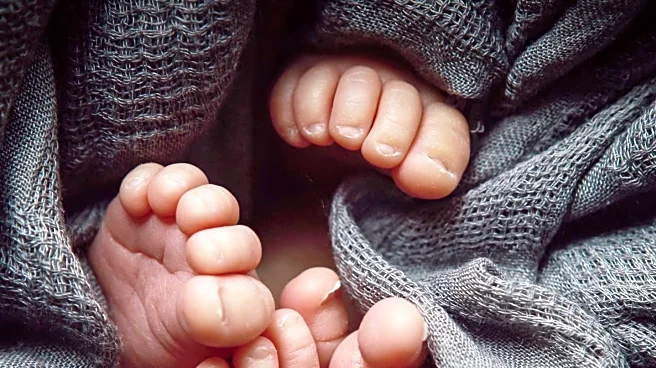What's Happening?
A study conducted by Cornell University has found that adults perceive the world as more dangerous when they are responsible for an infant. The research, published in Child Development, involved a virtual reality experiment simulating a roadside emergency. Participants, both parents and nonparents, reacted more quickly to potential threats when tasked with protecting a virtual crawling baby compared to when they were responsible for a dog or a toy robot. Psychology professor Michael Goldstein, co-author of the study, explained that the presence of a baby alters how adults process sensory information, an adaptation likely evolved to protect slow-developing human infants. The study also noted that women reacted faster than men, suggesting potential links to caregiving roles.
Why It's Important?
The findings of this study have significant implications for understanding human behavior and the evolutionary mechanisms that prioritize infant safety. By highlighting the perceptual shift experienced by adults when caring for infants, the research underscores the innate human tendency to protect young ones, which could influence parenting strategies and child safety measures. This heightened perception of danger may also impact societal norms around caregiving and the allocation of resources for child protection. Additionally, the study's insights into gender differences in reaction times could inform discussions on caregiving roles and responsibilities.
What's Next?
The study suggests further exploration into the gender differences observed, potentially examining the impact of societal and cultural factors on caregiving roles. Researchers may also investigate how these perceptual shifts influence long-term parenting strategies and child safety protocols. As the study indicates that nonparents also experience similar perceptual changes, there could be broader implications for community-based child safety initiatives and policies.
Beyond the Headlines
The study opens up discussions on the ethical and cultural dimensions of caregiving, particularly in societies where communal child-rearing practices are prevalent. It raises questions about how evolutionary adaptations influence modern parenting and societal expectations around child safety. The research may also contribute to debates on the psychological impacts of caregiving and the balance between vigilance and anxiety in parenting.










